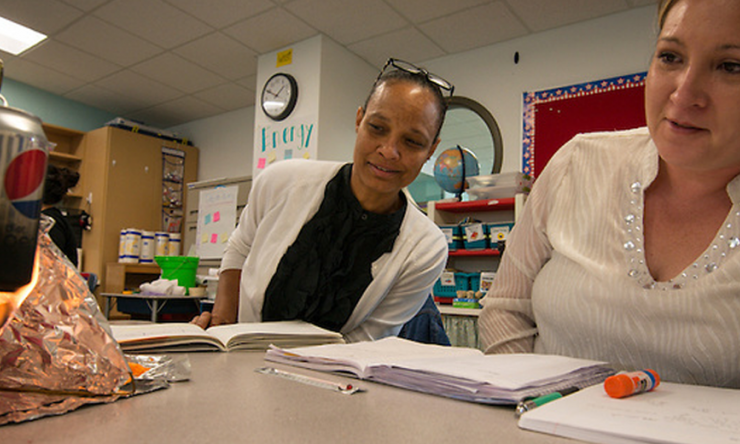
We provide in-person and web-based education and resources for teachers, students, and the general public—all designed to improve science teaching and learning, while promoting science skills and literacy, and general understanding of clinical and basic biomedical research.
Career Pathways
The Center for Educational Outreach offers educational programs leading towards careers in medicine and the health sciences, beginning at the middle and high school levels through undergraduate degrees and, depending upon academic requirements, entry into medical school.
Online Resources
BioEd Online and SuperSTAAR are dynamic online educational resources that provide science teachers with online courses, streaming video presentations, teaching slide sets, inquiry-based classroom activities and complete teaching resources. (PreK through Grade 12)
Curriculum Materials
BioEd teacher resources and materials from the Center for Educational Outreach offer an integrated, hands-on approach to teaching science, technology, engineering and mathematics. Each inquiry-based unit is aligned with national and state science education standards. Several units also contain integrated reading components.
Teacher Professional Development
The center’s professional development workshops provide learning experiences, where educators earn CEUs through face-to-face workshops or online courses. Workshops and topic series can be tailored to meet the needs and requirements of individual schools or school districts.
Our History
In 1982, the Division of School-Based and Minority Student Programs was established within Baylor’s Center for Allied Health Professions to coordinate activities with the Houston ISD at the High School for Health Professions (renamed Michael E. DeBakey High School for Health Professions in 1996). The new division quickly expanded upon its original charge by attracting extramural funding to create summer minority undergraduate programs and magnet health professions high schools in South Texas, and to build upon the college’s long-standing commitment to science teacher professional development.
By 1996, the division’s growth, and its success in helping the College address community problems associated with educational and career access issues, led then-Baylor president William Butler, M.D., to establish an academic program known as the Center for Educational Outreach. The center’s mission is to improve biomedical, basic science and health education across the K–16 continuum, and to increase opportunities for underrepresented populations to access careers in medicine, science and the health professions. Perhaps the center’s most important role is to increase participation in medical education for students from groups underrepresented in medicine due to economic status or ethnic/racial background (such activities now are required for LCME accreditation).
Today, the Center for Educational Outreach provides in-person and Web-based education and resources for teachers, students, and the general public, all designed to improve science teaching and learning, while promoting science skills and literacy, and general understanding of clinical and basic biomedical research. Through partnerships with museums, school districts, colleges and universities, and also via programs run independently by the center, it is addressing a broad range of needs across the educational continuum. In part through these efforts, Baylor is recognized as a leader among U.S. medical schools for its contributions to informal and precollege science and health education; and also for its commitment to program evaluation and research on best practices for science and health education. Evidence of the College’s ongoing commitment to the center and the community is seen in Baylor’s investment, in 2005, in a 1,600 square foot permanent teaching lab and new faculty/staff offices and support facilities for K–16 outreach at the Texas Medical Center's McGovern Campus.
BioEd Online
BioEd Online utilizes state-of-the-art technology to give you instant access to reliable, cutting-edge information and educational tools for biology and related subjects. Our goal is to provide useful, current, and high-quality information and materials that build upon and enhance the skills and knowledge of science educators. The following peer-reviewed resources are available. BioEd Online offers support for elementary, middle school and high school science teachers.
Resources
Online Courses
Free, web-based “anytime, anywhere," workshops and short courses are offered for teacher professional and other life-long learners. Content is presented by teachers, scientists and science educators. A certificate for "contact hours" is available upon completion of each workshop or short course.
Streaming Video Presentations
View timely presentations given by thought leaders on education in biology and related subjects, classroom management, science standards, and other issues in education. Presentation topics include content reviews for prospective biology teachers, content updates for experienced teachers, research lab technique demonstrations, inquiry science, and assessment. In addition, BioEd Online offers helpful presentations for teachers in training as they prepare for the classroom experience.
Slide Sets
Customize exciting and relevant lesson plans and activities from hundreds of searchable slides developed BioEd Online's Editorial Board and contributors. The slide library is updated regularly. Each slide is complete with talking points and references, and can be downloaded into your own PowerPoint program for personal educational use.
Lessons and More
Download free, inquiry-based, hands-on activities, complete teacher's guides, student storybooks and magazines, and student worksheets (PDF format), all created by scientists and educators at Baylor College of Medicine. Each activity is aligned with the National Science Education Standards.
Science News Articles
Stay current with science news selected by the Editorial Board from Nature News and other resources. Check back each week for new science stories and related discussion questions to complement your ongoing science activities, and to stimulate an exchange of ideas in your classroom. All News content is maintained in our archive for easy access.












